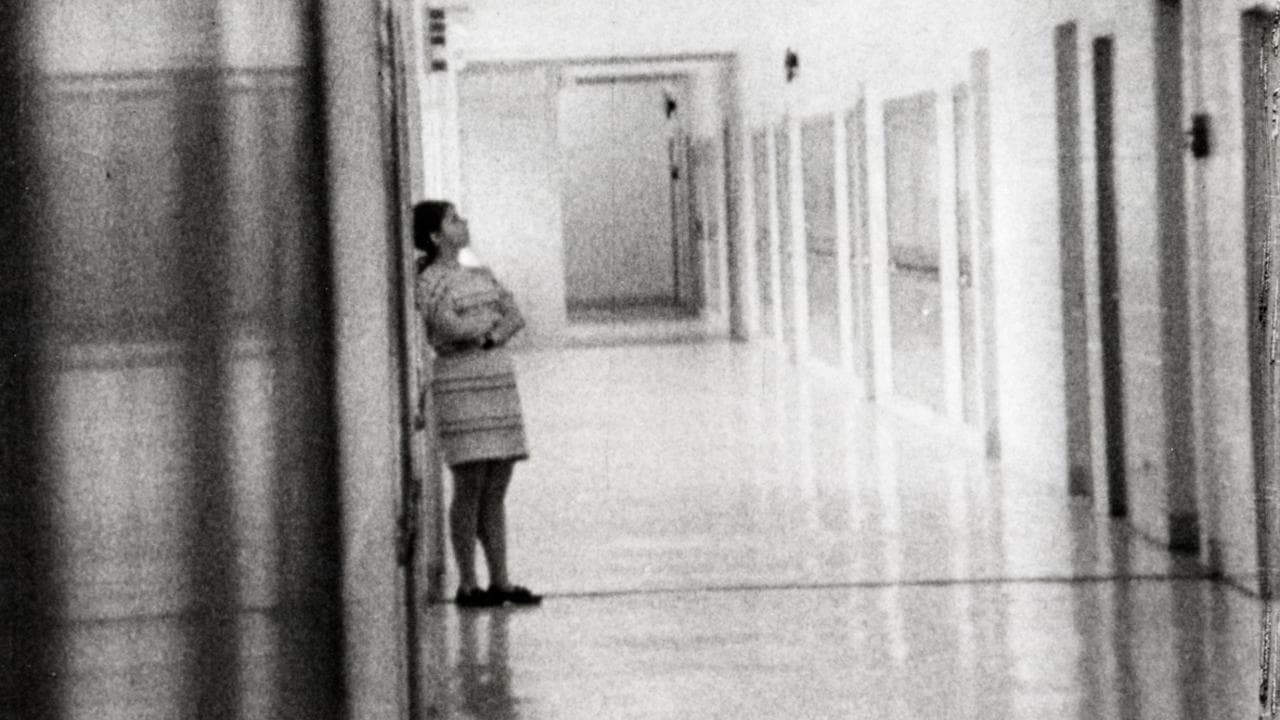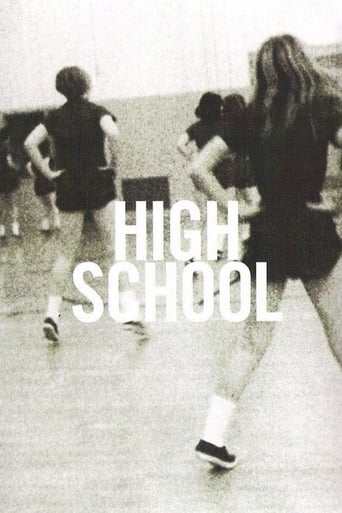

That was an excellent one.
... View Moredisgusting, overrated, pointless
... View MoreThis is a tender, generous movie that likes its characters and presents them as real people, full of flaws and strengths.
... View MoreIt’s fine. It's literally the definition of a fine movie. You’ve seen it before, you know every beat and outcome before the characters even do. Only question is how much escapism you’re looking for.
... View MoreIn his documentary "High School", Frederick Wiseman effectively uses the "cinema verite" approach to capture the oppressive environment in which the students of Northeast High School have to face everyday. Wiseman used a number of creative decisions in composition and editing to give "High School" its rhetorical voice. Perhaps most noticeable is the film's black-and-white format. Though likely to have driven by cost, it powerfully conveys a sense of banality of the atmosphere of the high school. Audience are aware of this being a conscious choice on the part of the director to not include color, but could this very decision also be a metaphor used to represent the actions taken by the authorities of the school and their consequences a dull, sterile environment in which students are sapped of their own individualistic colors. Also prevalent in the film is the use of juxtaposition to create situational ironies in order to further criticize, in a rhetorical matter, the institutional restraints of high school. Towards the beginning of the film, a scene is shown in which the professor is reading tasks off the bulletin of the day to a class. The next scene shows a foreign language class in which the teacher is lecturing on existentialism and various existentialist philosophers. The two scenes seem similar; in that both are in classroom settings and show a teacher lecturing and students listening, but the subjects in discussion contrast each other in their differences. The latter scene can even be interpreted as ironic itself, in that the subject lectured about, existentialism, suggests and requires abstract and free-form thinking, while it shows students reciting the material in an orderly manner. In the absence of a spoken narrative, the voice of "High School" relies much its effect on the indexical abilities of the documentary form and constructing messages out of the indexed recordings. One situation shows a student presenting a seemingly unfair scenario to a staff and expressing his disapproval of a teacher because that teacher had yelled at him and then unjustly given him detention. The staff is shown as uninterested in finding out more of the situation, and instead takes the side of the said teacher and starts to lecture the student about respecting the authority. The documentary form, especially the "cinema verite" model, has the ability to give the illusion of representing unbiased reality Wiseman's use of the indexing quality by showing various scenes in their entirety therefore strengthens the film's voice, as the audience is made to believe they are seeing the whole truth in a few scenes, and encouraged to extend that belief to the entire film. Though that is not to say the "High School" assumes a low audience activity. In fact, the role of the audience is pertinent to the effectiveness of this film. For example, Wiseman appeals to the emotions of the audience to achieve a stronger rhetorical effect. In the closing scene, a teacher tears up while reading a letter from a former student who is now a soldier serving in Vietnam. In the letter the former student does not only confess of his gratefulness for having attended that school because it made him a better person, but also reveal his devotion to the cause of the war and wants his insurance money to go to school if he is killed in Vietnam. The close-ups of the teacher's face reveal a wealth of emotions, expressing joy, perhaps out of self-gratitude for having helped in someway to shape the former student. The audience may perceive the letter as absurd and see it as a real-life consequence of the institutional constraints of the high school that reinforced blind obeying of authorities. Moreover, the tears of joy on the teacher's face may potentially reveal something even more horrifying the teacher is actually proud of her work and stands by the function of the school as an institution and the staff as authority figures.
... View MoreI just tripped over this review and was brought back by the comment from geprescott in 2003. I was also a student at Northeast High School, graduating in 1970.What I do remember about the pieces I saw was they were real but not quite true. These are images from long ago, but there was something of the fact that most teachers were trying and not intending to be caricatures as I remember them appearing in the film.What really got me to write was the description of the disciplinarian dean. I also had him as a 12th grade history teacher. Everything said about him by geprescott was very accurate. Our class was not required to read the Sunday New York Times, but I remember the year long project was to choose a country, research it, and then write its foreign policy. I picked the Soviet Union, did my research, and wrote a paper aimed at making life as difficult as possible for the US. I don't remember the actual comments but I remember being pleased with the final grade.I never saw this entire film and am not sure where to find it now. I'd like to watch it with my kids.
... View MoreLately I've been exploring the issue of ethics in the films of Fredrick Wiseman. In my entry on "Titticut Follies", among other things, I discussed how Wiseman's clear judgmental stance might be considered by some to be a breach of documentary ethics. Some feel that the goal of documentary is to be as objective as possible, others feels that it should be used as a tool for social change. Wiseman falls somewhere in the middle. Wiseman has stated that with "Titticut Follies" and his next film, "High School", he had more of a fixed idea of what he was trying to go for (as opposed to his later, more thematically ambiguous films). But even so, that does not mean that the individual member of the audience cannot get what he or she wants out of what has just been seen. In a 1998 interview with "The Boston Pheonix", Wiseman stated: "When [High School] was first shown in Boston, in 1969, one of the people who saw it was a very conservative member of the Boston School Committee. I thought she'd hate the movie. But she came up and said, 'Mr. Wiseman, that was a wonderful high school!' I thought she was kidding me until I realized she was on the other side from me on all the value questions. Everything I thought I was parodying, she thought was great. I don't think her reaction represents a failure of the film. Instead, we have an illustration that reality is ambiguous, a complex mirror that the 'real' film takes place where the mind of the viewer meets the screen. It's how the viewer interprets the events." In the above case, it would seem that the film is only unfair if you dislike what you see. The woman disagreed with what Wiseman was saying, but she still liked the film, because she felt that the images were strong enough to counter what Wiseman's intentions for the film were. So then does it really matter if he was "parodying" his subjects? Of course we could look deeper into a film like "High School", at more minute details, to see better, less broad examples of what could be considered unethical practices. In one scene, a teacher teaches a class and we see a close-up of her face, wearing thick, horn-rimmed glasses. About this shot, Calvin Pryluck writes, "One can wonder how the teacher in High School feels about herself since seeing herself seeing her bottle-thick eyeglass lenses larger than life on the screen." Small matters like this are important. But is the woman's appearance Wiseman's problem? Perhaps he chose the close up to emphasize the look on her face. Perhaps then if the woman feels embarrassed, then that is for her to worry about, no one else.
... View MoreSometimes odd, or funny, or nostalgic, this film really exemplifies the difference between the 1960s and today. There really isn't much difference, except in the clothing and the political agendas. But this film also shows a time where discipline was much more valued as opposed to today's standards. With the disintegration of the public school system, this could be a historical keepsake when the school system takes its last plunge.
... View More